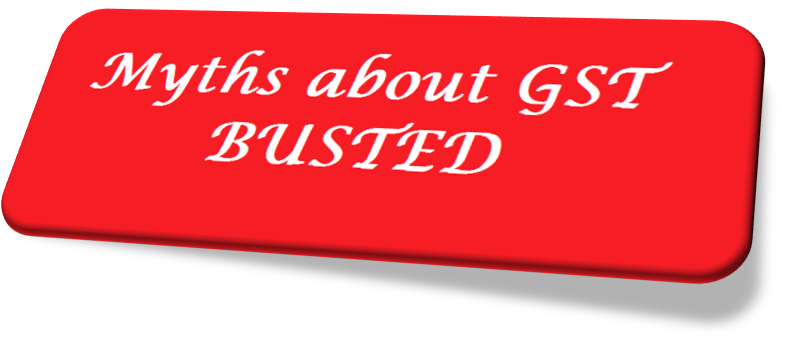There are lots of rumors going on in the public domain regarding GST. The rumors started even before the launching of GST. But I will say thanks to the electronic media because of which we get a clear picture of GST through news, social media, and through search engines rather than depending on a particular person to learn about GST. here is the list of the top eight myths about GST and reality check.

Let us see one by one what are the myths about GST and realities we have come across through.
1. Myth: You must have seen on many videos on television and on the internet that GST will replace all other taxes on all goods and services and hence it is “ONE NATION ONE TAX”.
Reality 1: Well this was the original idea to subsume all taxes under GST but products like petrol, diesel, and liquor are still outside GST’s ambit and, therefore, their tax rates vary significantly across states all over India. For example, petrol is still sold in Mumbai at Rs 74.30 per liter (as of 5 July) compared to Rs 63.12 in New Delhi. Secondly, on imports, Custom duty & Custom cess is also kept as a separate tax prevailing in past. Hence import tax structure will be customs duty + custom cess + GST under the GST system too.
2. Myth: The life of small business houses will suffer under GST computerized system, every business person should have computer and internet, and also he should be expert in computer knowledge to transact day to day business under this system.
Reality 2: The fact is you don’t not require computer system to make invoice and sell your products. you can make your invoice manually and it is very easy too compared to previous tax system. one needs computer and internet connectivity at the time of filing monthly returns and same is managed even in a cyber café.
3. Myth: Prices of all commodities will increase under the GST system and also your personal expenses will go up as the tax rates are fixed at higher levels ranging from 18% to 28%.
Reality 3: well, the GST rates looks high but it is only because many taxed like custom duty, central and state taxes, purchase tax etc. are subsumed in GST rate and it is visible to the customer now. In earlier system taxes like customs, Central excise where not shown on the invoice but it was included in product cost. If one adds up all the taxes then effective tax rates would have been more for most products.
4. Myth: Corporate business may try to profiteer but the government won’t make money at your expense.
Reality 4: Some states are securing their revenue by charging additional taxes instead of passing the benefit of GST to the end consumer. Recently Maharashtra government has increased the vehicle registration tax by 2% after automobile firms passed on the GST benefit by cutting their prices by 2-3%.
5. Myth: Now No other taxes will be charged on goods and services under GST world.
Reality 5: It is to be noted that GST only subsumes central and state taxes and the levies charged by local bodies are still kept outside the GST ambit. Using this loophole, the Tamil Nadu government has allowed its local bodies to charge 30% tax on movie tickets over and above GST. Now GST is 18% for movie tickets up to Rs 100 and 28% for tickets that cost more than Rs 100.
But because of local body levies, tax in Tamil Nadu will be 48% for tickets up to Rs 100 and 58% for tickets that cost more. Not surprisingly, the cinema hall owners in the state went on strike. Now the GST council should take action against it.
6. Myth: Economic growth of the country will go up in GST regime.
Reality 6: Economic growth comes from both organized and unorganized sectors. Although it is understood that tax evasion will be very difficult in GST and thus doing business in India will be easy. Therefore unorganized sectors will move up in the organized sector and this will lead to a little recorded economic growth.
7. Myth: Banks will charge GST twice, If you make use of Credit card.
Reality 7: There is no double GST for making payment through a credit card. The confusion aroused because there is an additional tax on convenience charges charged by the company to whom you use to make the payment via credit card. In past, the tax was 15% charged and now it’s 18% on the convenience charges.
So there is an increase of 3% tax on the convenience charges. For eg., if you make a payment of Rs. 15000/- to any company than to use your credit for making that payment they use to charge you Rs. 75/-. Therefore in past on Rs. 75/- you were charged 15% tax but now it is 18% which is slightly an addition of Rs. 2.25.
8. Myth: I have received only a provisional ID and waiting to receive the GST registration number/certificate to start the business.
Reality 8: Your provisional ID will be your GST registration number in GST, therefore you can start raising invoices under GST System as soon as you receive provisional ID.
Related Articles
www.gst.gov.in dashboard
Check out the functions available at www.gst.gov.in, the official portal of GST in India. As soon you login into the portal, you can access the dashboard of the system. more
How to login GST portal with ARN?
Login with ARN is a pre-GST login process. The applicant receives his ARN number after submitting an online GST Registration application. Therefore, the applicant can track the status of the application without having login details. more
How GST is calculated in India?
Use our online GST to calculate GST on any value you enter. Similarly, the calculator will calculate GST on reverse basis i.e calculate GST on your MRP price. more
Latest GST Notifications and Circulars
The government has recently issued one GST notification on e invoicing. Similarly, one GST circular is also issued on the GST refund process. more

